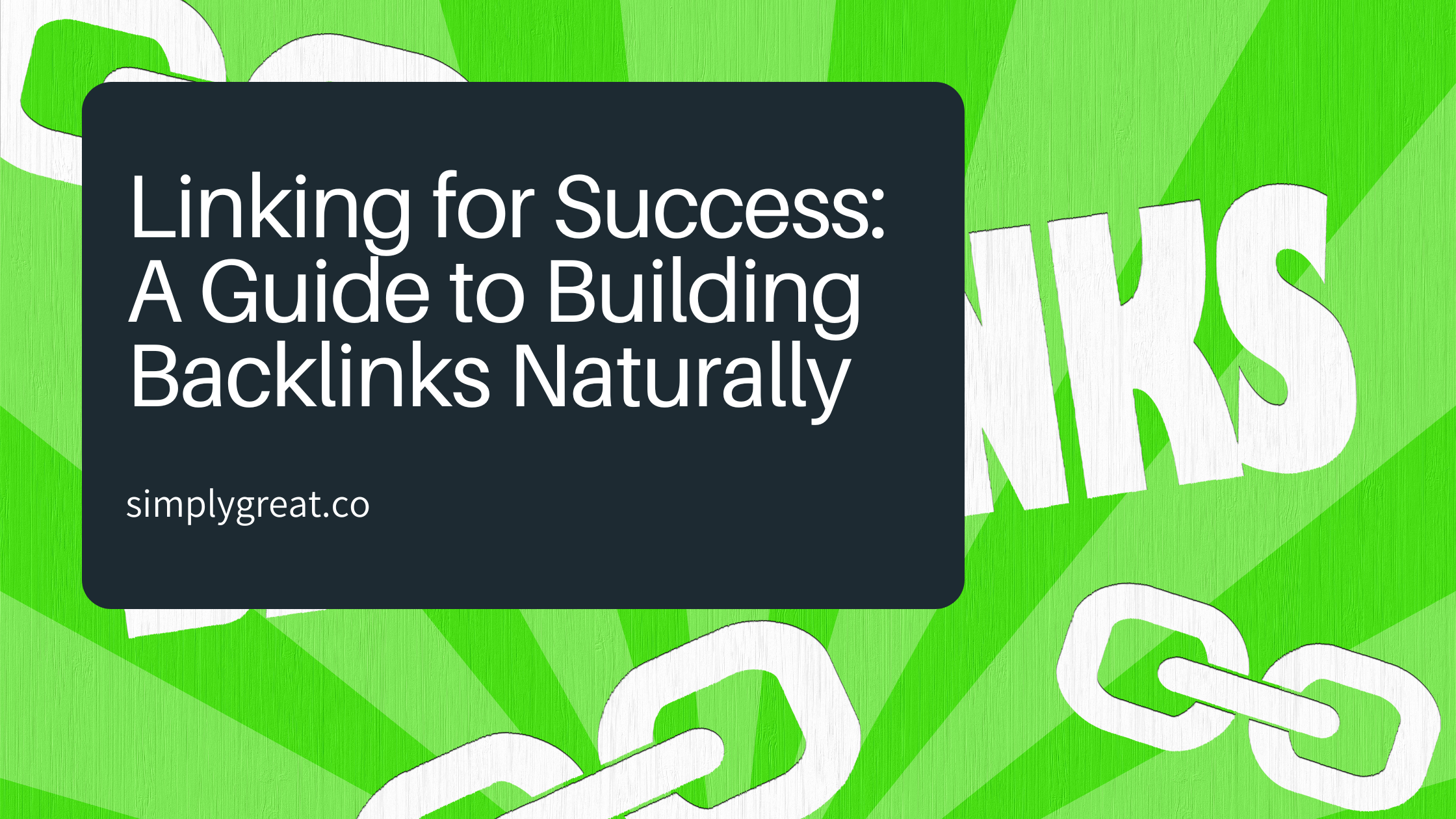As a website owner or marketer, you’re probably already familiar with the term backlinks. Backlinks, also known as inbound or incoming links, are links from other websites that lead to your website. In the world of search engine optimization (SEO), backlinks are essential for improving a website’s ranking on search engines.
In this article, I’ll explain the importance of backlinks in SEO, the difference between natural and unnatural backlinks, the risks of unnatural backlinks, and provide a guide to building backlinks naturally. So skip the what is backlinks section below, and dive into the different backlinking strategies here.
What are backlinks?
Backlinks are the links that take you from one page or website to another website’s page. External links, one-way links, inbound links, and incoming links are the same as backlinks. The job of a backlink is to help a website rank higher in search engines such as Google. A higher number of quality backlinks mean higher ranking and more traffic to the website.
If you want your website to rank higher in SERP (Search Engine Results Page), you need other websites to link to your website, or you can also say that your website needs more backlinks.
Google measures your website’s worth and ranks it according to the number of backlinks it has. Consider backlinks as votes. The more votes or backlinks your website has, the higher chances of ranking your website on top you have.
Importance of Backlinks in SEO
Search engines like Google use complex algorithms to determine which websites to display on the first page of search results. Backlinks are one of the most important factors in these algorithms. Essentially, search engines view backlinks as votes of confidence for a website’s content. The more high-quality backlinks a website has, the more likely it is to rank higher in search results.
However, not all backlinks are created equal. Search engines also consider the relevance and authority of the website linking to yours. For example, a backlink from a reputable website in your industry is more valuable than a backlink from a spammy or unrelated website. That’s why it’s essential to focus on building high-quality backlinks rather than simply acquiring as many as possible.
Difference between Natural and Unnatural Backlinks
There are two types of backlinks: natural and unnatural. Natural backlinks are earned when other websites link to your content without any request or manipulation on your part. Unnatural backlinks, on the other hand, are acquired through tactics that violate search engine guidelines, such as buying links or exchanging links for the sole purpose of improving search engine rankings.
The Risks of Unnatural Backlinks
While building backlinks can be a powerful SEO strategy, it’s important to avoid any tactics that could be considered unnatural. Search engines have become increasingly sophisticated at detecting and penalizing websites that engage in manipulative link-building practices. If search engines determine that your website has unnatural backlinks, you could face severe penalties, including a drop in search rankings or even a complete removal from search results.
How to Build Natural Backlinks
To avoid the risks of unnatural backlinks, it’s important to focus on building natural backlinks. This involves creating high-quality content that other websites will want to link to naturally. Here are some tips for building natural backlinks:
1. Create High-Quality Content
The first step to building natural backlinks is to create high-quality content that other websites will find useful and relevant. This could include blog posts, infographics, videos, or any other type of content that your audience will find engaging.
2. Promote Your Content
Once you’ve created high-quality content, you need to promote it. Share your content on social media, email newsletters, or any other channels where your audience is active. The more people who see your content, the more likely it is to be shared and linked to by other websites.
3. Reach Out to Influencers
Identify influencers in your industry who are likely to be interested in your content. Reach out to them and ask if they would be willing to share your content with their audience. This can help to increase the visibility of your content and attract more natural backlinks.
4. Participate in Online Communities
Join online communities in your industry and participate in discussions. This can help you to build relationships with other website owners and influencers who may be interested in linking to your content.
Linking Strategy for Building Natural Backlinks
Building natural backlinks requires a strategic approach. Here are some tips for developing a linking strategy:
1. Focus on Quality, Not Quantity
As mentioned earlier, it’s important to focus on building high-quality backlinks rather than simply acquiring as many as possible. A few high-quality backlinks from reputable websites are much more valuable than many low-quality backlinks from spammy or irrelevant websites.
2. Diversify Your Backlink Profile
A diverse backlink profile that includes links from a variety of sources is more valuable than a profile that is heavily skewed towards one type of link. For example, a backlink profile that includes links from social media, blogs, and industry directories is more valuable than a profile that includes only blog comment links.
3. Monitor Your Backlinks
It’s important to monitor your backlinks regularly to ensure that they are natural and high-quality. Use tools like Google Search Console, Ahrefs, or SEMrush to monitor your backlinks and identify any potential issues.
Guest Posting for Backlinks
Guest posting is a popular tactic for building natural backlinks. This involves writing high-quality content for another website in your industry in exchange for a backlink to your website. Here are some tips for guest posting:
1. Identify Relevant Websites
Find websites in your industry that accept guest posts. Look for websites with a high domain authority and a strong reputation in your industry.
2. Write High-Quality Content
When writing a guest post, make sure to create high-quality content that is relevant to the website’s audience. Avoid overly promotional content and focus on providing value to the website’s readers.
3. Include a Relevant Backlink
Include a backlink to your website within the guest post. Make sure the link is relevant to the content and provides value to the reader.
Quality vs Quantity of Backlinks
When it comes to backlinks, quality is more important than quantity. A few high-quality backlinks from authoritative websites are much more valuable than many low-quality backlinks from irrelevant or spammy websites. Focus on building a diverse backlink profile that includes high-quality links from a variety of sources.
Tools for Monitoring Backlinks
Monitoring your backlinks is essential for ensuring that they are natural and high-quality. Here are some tools you can use to monitor your backlinks:
1. Google Search Console
Google Search Console is a free tool from Google that allows you to monitor your website’s performance on search engines. It includes a backlink report that shows you the websites that link to your website.
2. Ahrefs
Ahrefs is a paid tool that allows you to monitor your backlinks and analyze your website’s performance. It includes a backlink report that shows you the websites that link to your website, as well as information on the quality of those links.
3. SEMrush
SEMrush is another paid tool that allows you to monitor your backlinks and analyze your website’s performance. It includes a backlink report that shows you the websites that link to your website, as well as information on the quality of those links.
Conclusion
Building natural backlinks is essential for improving your website’s ranking on search engines. By creating high-quality content, promoting it, and building relationships with influencers, you can attract natural backlinks that will help to improve your website’s visibility and authority. Remember to focus on quality over quantity, diversify your backlink profile, and monitor your backlinks regularly to ensure that they are natural and high-quality. With the right strategy, you can build backlinks naturally and achieve success in SEO.
Why Do Backlinks Matter?
To understand why are backlinks a big deal, answer a simple question: Why would someone want to link their article or website to your website or article?
They would want to link to your website if your website has good content or authentic information that solves a problem for them and they want their readers to check it out as well. This means that your website has good content so Google decides that it deserves to be on top in SERP.
Backlinks are one of the three most significant ways to rank your website according to Google. But your website does not need just any backlinks. It needs relevant and high-quality backlinks.
The Proper Way to Use Backlinks
Gone are the days when Google let people rank their websites with irrelevant and poor backlinks. Backlinks from untrusted and unrelated websites are called bad backlinks. If you run a cooking website and your website has backlinks from a pet store or a porn website then those bad backlinks are doing more harm than good.
To create successful backlinks that help organically rank your website, there are a few things you need to know:
Look for Guest Posting Websites: Many website owners these days allow you to guest post on their website in exchange for money or sometimes a free article. People charge for guest posts according to their website’s traffic. Websites with higher traffic often charge higher for guest posts.
Write Crisp Content: If you want to get backlinks, you need to improve your content. People will start linking to your website or articles when your website has quality content that can be of use to their users. Also, if the content is crisp, easy to read, and engaging, more people will start visiting your website.




